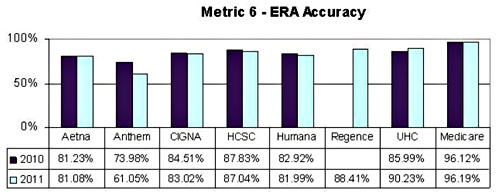According to the AMA, commercial healthcare insurers are getting worse at processing claims quickly and accurately:
According to the AMA’s latest findings, commercial health insurers have an average claims-processing error rate of 19.3 percent, an increase of two percent compared last year. The increase in overall inaccuracy represents an extra 3.6 million in erroneous claims payments compared to last year, and added an estimated $1.5 billion in unnecessary administrative costs to the health system….Physicians received no payment at all from commercial health insurers on nearly 23 percent of claims they submitted.
And who did best on this measure of administrative efficiency? Medicare, with an accuracy rate of over 96%. The full results for a broad measure of claims accuracy are below.



















